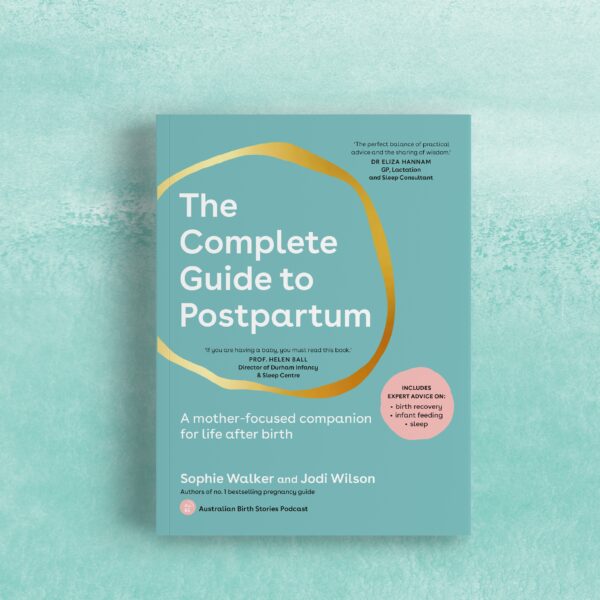Postpartum What To Expect in the Fourth Trimester
What To Expect in the Fourth Trimester

The 12 weeks after birth is often referred to as the fourth trimester. The fourth trimester is an intense period that can be incredibly challenging, especially if you don’t know what’s normal or expected.
What is the Fourth Trimester?
The 12 weeks after birth is often referred to as the fourth trimester. It’s a term coined by US paediatrician Harvey Karp in 2002, that highlights the fact that even though your baby is outside your body, they’re still very much connected to you. Indeed, newborn babies are still growing and functioning as if they’re in utero; wholly dependent on you as they very slowly and tentatively adjust to life outside the womb.
The fourth trimester is an intense period that can be incredibly challenging, especially if you don’t know what’s normal or expected. Even the normal and expected parts are hard; you are recovering and healing from birth, processing your birth, learning to read your baby’s cues, and establishing a breastfeeding rhythm or feeding routine and you’re doing this while navigating sleep deprivation. It’s a time of significant upheaval where everything is unknown and you’re experiencing almighty hormonal shifts, too.
What to expect in the fourth trimester.
Postpartum simply means after birth. Essentially, once you have birthed your baby, you are always in postpartum. During the fourth trimester (which you may prefer to call early postpartum) your baby wants to be near you – or preferably on you – for most of the time. You are all they’ve ever known and it’s helpful to remember that you are their home; they are comforted and soothed by your touch, smell and voice.
The fourth trimester is a period of vulnerability for yourself and your baby. It’s good to keep this in mind as you prepare for postpartum because it will encourage you to create a solid foundation of support for yourself.
“The dread of going into the night alone with a baby is very normal because it’s not how we were designed. In many traditional societies, and even societies today, like Indigenous communities, babies would have multiple adult carers – sometimes 8-14 – every single day. Doing this job of raising a baby at home alone, with not a lot of friendship or professional support, informational support or support with basic chores like cooking and cleaning, is exhausting. I hope this understanding can help you be more forgiving and compassionate towards yourself, to lower your standards. It’s hard, but understanding that it takes a village to raise a child – in a very literal sense – can help you in early postpartum and encourage you to reach out for support whether that’s childcare, meal deliveries, help from family and friends or guidance from a health professional.” – Julia Jones Episode 378
During pregnancy you can learn about the basics so you have a good understanding of what’s normal and expected (and on the flip side, what’s not):
Breastfeeding : breastfeeding may be the natural next step after birth but that doesn’t mean that it comes easily or naturally. Learning about breastfeeding in pregnancy is essential preparation so you can better understand how your body produces milk, what you can do to facilitate this process and what you can expect from your baby. It’s also a really good idea to have the name and number of a local lactation consultant on hand in case you need professional guidance. Remember that the Australian Breastfeeding Association has a 24-hour breastfeeding counselling helpline which is always helpful. Call 1800 686 268 (write this number on a piece of paper and stick it on your fridge).
Sleep : How can you possibly prepare for interrupted sleep? The short answer is, you can’t. However, you can better understand the power of postpartum rest, which isn’t always sleep, but conscious downtime. A lot of traditional cultures link the postpartum experience to the menopause experience; a rested postpartum can benefit you for the rest of your life. How can you rest with a newborn?
– Lie horizontal as often as you can. This is significantly beneficial for pelvic floor recovery but it also means that you’re not in an active, doing position and therefore, you’re resting. You can also breastfeed in this position (make sure your baby is not near any pillows or blankets).
– Limit visitors. Socialising is exhausting and in the fourth trimester, it’s advisable to keep visitors to a minimum so you can rest and recover. Many postpartum doulas encourage new parents to invite people who will help; trusted friends and family who will bring meals, assist with household chores, and take care of your older children.
– Rest your senses : you’re in a vulnerable and sensitive state after birth so you want to keep stress, anxiety and distractions to a minimum. Create a bedroom cocoon with everything you need to feel comfortable and supported; limit your screen time, prioritise naps and go to bed in the early evening. Read more about postpartum rest here.
Mental Health : the brain changes that occur in the fourth trimester are significant and they coincide with enormous hormonal shifts that can have you crying with joy one minute and doubting your ability the next. The seesaw of emotions is very normal but it can be exacerbated by a traumatic birth experience, sleep deprivation, lack of support and breastfeeding challenges. Having trusted family members and friends to talk to – to debrief your birth, process your thoughts and make sense of your mothering experience – is essential in early postpartum. If you, or they, feel like your overwhelm is becoming prolonged anxiety and/or depression, or if you feel like you may need to chat to a professional, PANDA’s helpline is a great point of contact: 1300 726 306 (Monday to Saturday). You may also want to reach out to your GP who can create a mental health care plan for you.
If you would like to hear more about the fourth trimester from a postpartum doula, listen to Sophie’s chat with Julia Jones in Episode 378 HERE.
Categories
Related Products
-
The Complete Guide to Postpartum: A Mother-Focused Companion for Life After Birth
$34.95Full of expert advice, mothers’ stories, and evidence-based information that will guide you into motherhood with confidence.
Get your copy of our Perineal Massage Guide in your inbox
Keep Reading
We think you might enjoy these articles

Breastfeeding: What to Expect in the First 72 Hours

Why planning for postpartum is just as important as planning for birth – and how to do it right

Cracked Nipples: Causes, Treatment and Prevention

Caesarean Birth Recovery

What is a C-Section Shelf?
@AustralianBirthStories
Follow along with us
@AustralianBirthStories
Follow along with us
@AustralianBirthStories
Follow along with us
@AustralianBirthStories
Follow along with us
@AustralianBirthStories
Follow along with us
@AustralianBirthStories
Follow along with us
@AustralianBirthStories
Follow along with us
@AustralianBirthStories
Follow along with us
@AustralianBirthStories
Follow along with us
@AustralianBirthStories
Follow along with us
@AustralianBirthStories
Follow along with us
@AustralianBirthStories
Follow along with us



